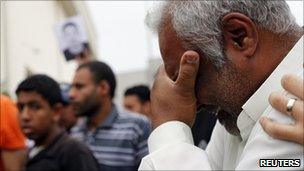Bahrain police jailed over death of activist in custody
- Published

A court in Bahrain has sentenced two police officers to 10 years in prison after convicting them of causing the death in custody of a Shia activist.
Ali Issa Ibrahim Saqer died of shock after being beaten at the Dry Dock Jail in Manama while being held on "national security" charges in April 2011.
But the court cleared the officers of also causing the death of another detainee, Zakaraya Rashed Hassan.
Meanwhile, six men accused of defaming the king on Twitter have been arrested.
Chief prosecutor Nayef Youssef told the state news agency that their posts on the social media website had contravened "the right to exercise freedom of expression".
Under Bahrain's constitution, the king is considered "inviolate".
The Bahrain Youth Society for Human Rights expressed concern about the arrests and noted they had taken place on Tuesday, which also happened to be World Day Against Cyber Censorship.
'Multiple trauma'
Mr Saqer's family said he had turned himself into police in Hamad Town, in the west of Bahrain, on 3 April 2011, weeks after security forces launched a violent crackdown on mass pro-democracy demonstrations led by the kingdom's Shia majority community.
Police had been looking for him in connection with an incident during a protest in which the authorities alleged that he had tried to run over a policeman with his car but hit a protester.
Nothing more was heard from Mr Saqer until 9 April, when the interior ministry announced that he had died in custody. It alleged he had "created chaos" inside the prison, "which led the security forces to bring the situation under control".
Human Rights Watch inspected Mr Saqer's body before his funeral and reported that it showed the signs of severe physical abuse, including large bruises, cuts to his eye, lash marks across his back, blackened feet, and lacerations on his ankles and wrists.
A death certificate issued by the Bahrain Defense Force Hospital given to his family listed the cause of death as "hypovolemic shock", a condition usually brought on by extreme loss of blood. The cause of the shock was "multiple trauma", it added.
On Wednesday, the First High Criminal Court found the two police officers guilty of battery. However, they were acquitted of causing the death of Zakaraya Hassan who, the interior ministry said, died of complications from sickle cell anaemia while in detention on 9 April 2011.
Mr Hassan, a former member of parliament from the main Shia opposition group al-Wifaq and administrator of a blog which carried commentary critical of the government, had been arrested on 2 April in the village of Dair.
His brother, Ali al-Asherri, contested the government's claims about his death, telling Human Rights Watch that although he had had sickle cell anaemia, he had never suffered any ill-effects.
The authorities provided the family with a death certificate saying Mr Hassan had died of shock, Mr Asherri said, and provided a photograph of his body showing a wound on the right shoulder, a gash on the nose and some blood that had issued from the ears and lips.
Sickle cell anaemia is an inherited genetic condition common among Bahrain's population. Named after the distinctive - but abnormal - shape formed by red blood cells, it can cause damage to organs or, in some cases, strokes. If not treated, it can be fatal.
Prosecutors said they were reviewing the "not guilty" verdict in Mr Hassan's case.